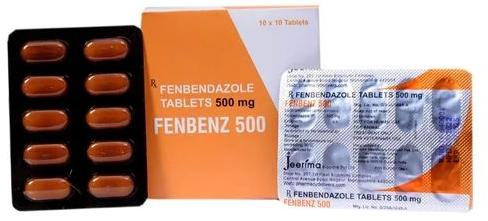Recognizing the Benefits and Uses of Fenbendazole in Vet Medicine
Fenbendazole has developed itself as an essential anthelmintic in vet medication. Its capability to target different parasitical infections makes it a beneficial device for vets. The drug's device interrupts vital mobile processes in bloodsuckers, leading to reliable treatment results. Its safety profile varies between types, demanding mindful consideration in its use (222 mg). Comprehending these characteristics can clarify fenbendazole's broader implications in veterinary care and ongoing research study into its prospective beyond standard applications
System of Activity of Fenbendazole

Common Parasitic Infections Dealt With With Fenbendazole
A selection of parasitical infections are efficiently treated with fenbendazole, making it a functional choice in vet medicine. This anthelmintic agent is particularly effective versus nematodes, consisting of roundworms and hookworms, which typically affect pet dogs and pet cats. It is also used for the treatment of cestodes, such as tapeworms, providing a broad spectrum of activity against both types of digestive tract parasites. In addition, fenbendazole is valuable in handling infections brought on by protozoa, specifically Giardia, which can cause stomach distress in pets. Its effectiveness reaches treating specific lungworms in pooches and felines, addressing respiratory health and wellness concerns connected to these parasites. Generally, fenbendazole's ability to target several parasitical types makes it a valuable device in veterinary method, making certain the health and wellness and health of pet dogs impacted by these common infections.
Security and Efficiency in Various Pet Species
The security and efficacy of fenbendazole differ among various animal varieties, underscoring the significance of species-specific considerations in veterinary medication. In dogs, fenbendazole is generally well-tolerated and reliable against a series of gastrointestinal parasites, including roundworms and hookworms. For felines, nonetheless, its use is much less usual and may need mindful application because of prospective adverse responses.
In animals, such as cattle and sheep, fenbendazole demonstrates effectiveness versus different endoparasites, adding to improved health and productivity. The pharmacokinetics and possible side results can differ noticeably between types, requiring careful evaluation by vets.
Horses also react positively to fenbendazole, especially for treating strongyles and ascarids, though dosage and management routes have to be customized to their one-of-a-kind physiology. Subsequently, recognizing these differences is crucial for maximizing treatment outcomes and guaranteeing animal why not check here well-being throughout diverse types.
Management and Dose Guidelines
Correct administration and dose guidelines are vital for taking full advantage of the healing results of fenbendazole while reducing possible negative effects. The dosage typically differs depending upon the types being dealt with, the details condition, and the formulation of fenbendazole utilized. fenbendazole 444. For pets and felines, an usual dosage is 50 mg/kg body weight, carried out once daily for 3 consecutive days, however vets might adjust this based upon specific wellness assessments
It is necessary to provide fenbendazole with food to improve absorption and lessen stomach trouble. The medication is additional info available in different kinds, including granules and paste, enabling adaptable administration choices. Monitoring the pet's response during and after therapy is suggested to validate efficiency and security. Additionally, veterinary advice is vital to identify the ideal period of therapy based upon the sort of parasitical infection being attended to, guaranteeing excellent outcomes for the pet's health and wellness.
Future Perspectives and Research on Fenbendazole
Study on fenbendazole proceeds to develop, focusing on its possible applications beyond typical antiparasitic usages. Recent studies have actually discovered its performance in dealing with various forms of cancer, particularly in veterinary oncology. Preliminary data suggest that fenbendazole may inhibit the growth of lump cells and boost the results of other chemotherapeutic representatives.
In addition, researchers are exploring its function in managing food poisonings in pets, highlighting its anti-inflammatory properties. The flexibility of fenbendazole for various species increases questions regarding its safety and security profiles and excellent dosing routines in varied populaces.
As rate of interest grows, there is try this site a demand for thorough professional tests to establish evidence-based standards for these unique applications. Future study might additionally examine the devices behind fenbendazole's effects, potentially leading the means for innovative healing strategies in veterinary medication. The ongoing expedition of fenbendazole could greatly enhance therapy choices for various veterinary conditions.

Often Asked Questions
Is Fenbendazole Safe for Pregnant Animals?
The safety and security of fenbendazole for expectant animals continues to be unpredictable. While some researches suggest minimal danger, veterinarians typically suggest caution and often discourage its use while pregnant unless the advantages clearly exceed potential risks.
Can Fenbendazole Be Made Use Of in Animals?
Fenbendazole is typically made use of in animals to deal with numerous parasitic infections. 222 mg. Its efficiency versus stomach worms makes it a beneficial anthelmintic, adding to improved wellness and productivity in animals increased for food and fiber
What Are the Adverse Effects of Fenbendazole?

The side results of fenbendazole might include intestinal disturbances, lethargy, and allergies. In rare cases, much more severe responses might occur, demanding cautious surveillance and consultation with a vet during treatment.
Just How Does Fenbendazole Contrast to Various Other Dewormers?
Fenbendazole uses broad-spectrum efficiency versus different parasites, typically comparing positively to other dewormers. Its unique system targets different life phases, making it reliable, while typically presenting a favorable safety account contrasted to options offered on the market.
Can Fenbendazole Be Used for Treating Cancer in Animals?
The possibility of fenbendazole in dealing with cancer cells in pet dogs has actually gathered rate of interest. Preliminary studies recommend it might inhibit cancer cell development, however even more research is essential to verify its efficiency and safety in veterinary oncology.